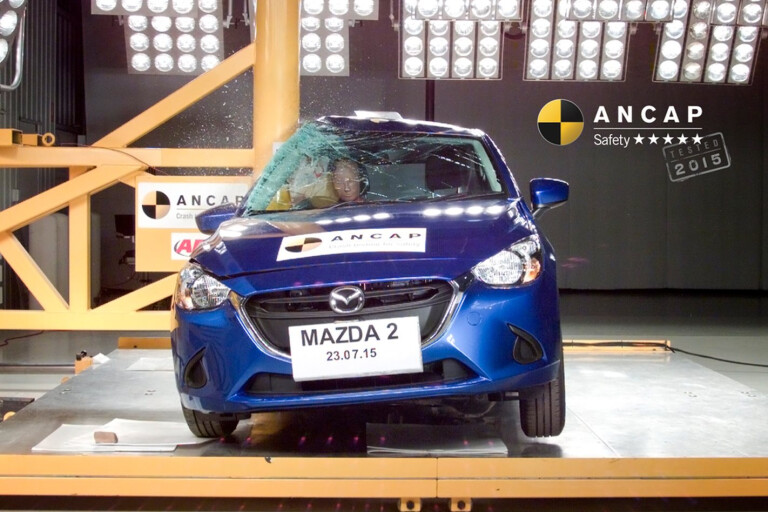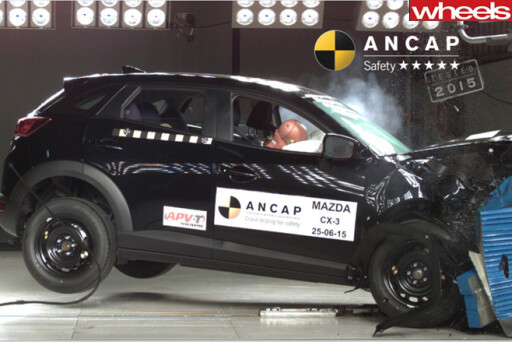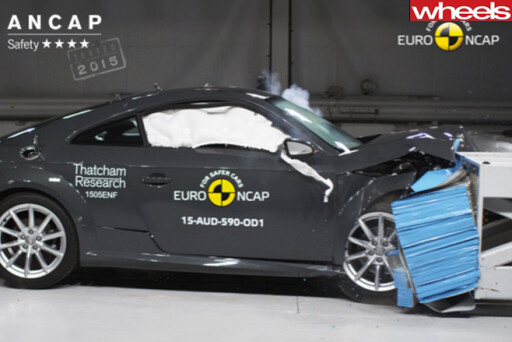
AUSTRALIA’S safety watchdog has lauded two cars that sting buyers for crash avoidance technology, despite its European equivalent penalising the same cars heavily for doing the same thing.
The Australasian New Car Assessment Program has awarded the Mazda 2 city car and the Mazda CX-3 small SUV its maximum five-star crash safety rating, despite EuroNCAP awarding both cars only a four-star rating.
Under EuroNCAP’s assessment criteria, carmakers are penalised for pushing driver aids onto the options list rather than supplying them as standard equipment – a factor highlighted in the Mazdas’ lower EuroNCAP scores.
Announcing the Australian result, ANCAP praised Mazda for offering autonomous emergency braking (AEB), which can either avoid or minimise damage and injury from a low-speed crash, as a $400 option on the 2 and a $1030 option on all but the most expensive CX-3.
 “Both the Mazda 2 and CX-3 offer very good occupant and pedestrian protection and have autonomous emergency braking available as an option,” ANCAP said.
“Both the Mazda 2 and CX-3 offer very good occupant and pedestrian protection and have autonomous emergency braking available as an option,” ANCAP said.
In contrast, the low-slung two-door Audi TT sports coupe, which doesn’t have AEB, earned a four-star rating – the same result it was given by EuroNCAP – and received a stinging blow from ANCAP for not doing enough to protect children.
“Although the TT performed well in numerous areas for adult occupants and pedestrian protection, insufficient safety assist technologies and inadequate child occupant protection caused the TT’s overall rating to be limited to four stars,” it said.
The TT was scored using European crash test data, while the Mazda scores were both assessed using ANCAP’s local crash testing regime.
Audi Australia said all its cars were designed to exceed global requirements for safety, and that a four-star result for the TT was still “very good”.
“Euro NCAP and ANCAP referenced the fact that the limited space in the rear meant that certain child seats could only be used with restrictions or were difficult to fit,” Audi Australia senior product communications executive Shaun Cleary said.
“But here, too, the Audi TT achieves a strong rating in the sports car category.”
 Under ANCAP’s “accept nothing less” campaign promoting five-star safety, the crash safety authority recommends that car buyers avoid vehicles such as the Audi TT, and instead buy cars that come standard without the very technology the TT was penalised for not having.
Under ANCAP’s “accept nothing less” campaign promoting five-star safety, the crash safety authority recommends that car buyers avoid vehicles such as the Audi TT, and instead buy cars that come standard without the very technology the TT was penalised for not having.
ANCAP says AEB should “increasingly be included in Australian cars due to its lifesaving potential”.
“AEB is a technology that will reduce the number of deaths and injuries from road crashes,” ANCAP chief executive Nick Clarke said this year at the launch of a national campaign to have it fitted as standard to all cars sold here.
“While the number of people killed on Australia's roads is declining, road crashes are still unnecessarily killing around 1200 people every year,” he said.
“Technology like AEB will go a long way towards reducing the number of fatalities.”
However, the group also notes that almost half of fatal crashes do not involve another vehicle.
ANCAP is currently in the middle of a three-year plan to align its crash testing framework with that of EuroNCAP.
A special Wheels investigation this year found the changeover process had thrown Australia’s crash test into disarray, making it confusing for consumers and potentially costing carmakers sales.
The changeover process has allowed cars such as the Renault Captur, which before the first of the changes introduced at the start of this year would have received a four-star crash rating, to gain a top five-star stamp.
The investigation noted that some cars tested here were being penalised by ANCAP for missing out on features not directly linked to occupant safety, such as smart keys and trailer stability control.

COMMENTS